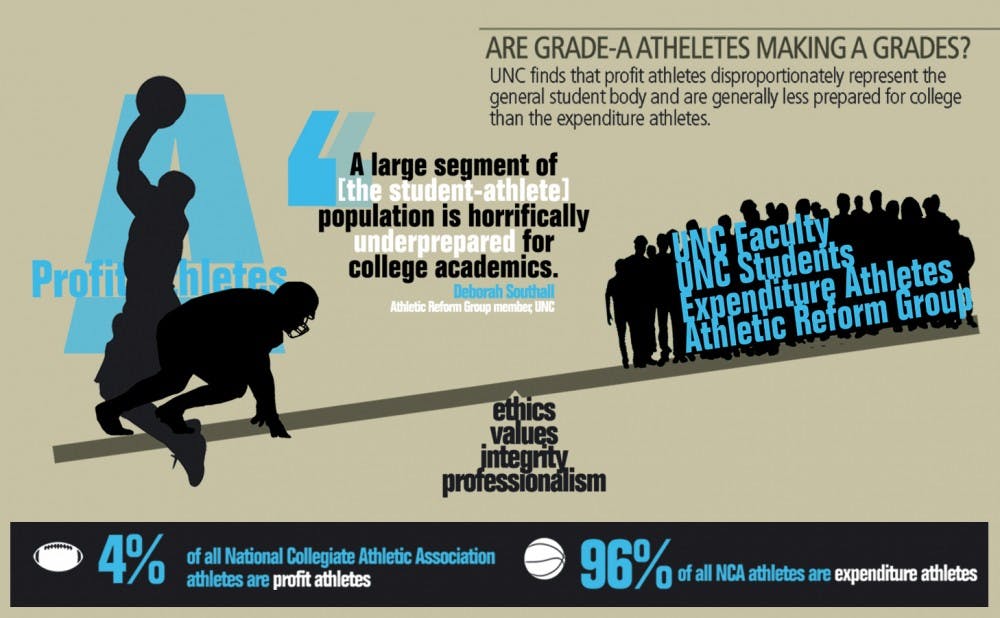A group of faculty at The University of North Carolina at Chapel Hill is trying to ensure that the university’s grade A athletes have the resources to make A grades.
The Athletic Reform Group, an organization composed of UNC faculty, issued a statement Thursday expressing concerns about topics ranging from student athlete academics to head injuries. The group was founded in the wake of UNC’s 2011 academic scandal, in which several high-profile athletes were found to be enrolled in classes that either did not meet regularly or did not exist.
Deborah Southall, a member of the group and lecturer of exercise and sport science at UNC, said that the current system puts some athletes at a disadvantage in the classroom.
“A large segment of [the student-athlete] population is horrifically underprepared for college academics,” Southall said.
Southall noted that there is pressure to give athletes grades they do not deserve instead of expecting them to be at the same academic level as other students.
“It puts me in a position to have to challenge my own professionalism, integrity, ethics and values,” Southall said.
Southall noted one summer when a UNC basketball player had enrolled in one of her classes. The player far surpassed the maximum number of absences allowed by class rules. As a result, she gave him a failing grade.
“That was a rough year for me,” Southall said. “I didn’t get too many basketball players in my class after that.”
But the problems of college athletics extend beyond the bounds of UNC’s campus because players come from differing socioeconomic backgrounds and educational preparedness, noted Richard Southall, former ARG member and director of the College Sport Research Institute at the University of South Carolina. Athletes in revenue sports are generally less prepared for college than other athletes, he added.
Of all National Collegiate Athletic Association athletes, only 4 percent are “profit athletes.” Richard Southall said the other 96 percent are “expenditure athletes,” who are able to compete even though they do not generate profit, because football and men’s basketball raise enough money to cover expenses of other athletic teams. As a result, there is little incentive for expenditure athletes—the majority—to support stricter academic criteria for all athletes, including those in revenue sports.
“96 percent of the athletes want to keep their mouth shut [about the current revenue system],” he said.
Brad Berndt, associate director of athletics, academic services and student services at Duke, said the admissions criteria for athletes must be determined by individual universities.
“It is an institutional issue and not an NCAA issue,” Berndt said. “Each school has to decide what type of student can succeed.”
Deborah Southall said that she was frustrated with the response the group has gotten from UNC.
“Why are we even having to talk about some of these things?” she said.
She added that her communications with UNC Athletic Director Lawrence “Bubba” Cunningham have been unproductive.
“We have had dialogues and [Cunningham] has always appeared to be very open to listening and discussing the concerns,” Deborah Southall said. “[But] after a while you get the smiles and the nodding heads.”
Cunningham could not be reached for comment.
Jay Smith, the ARG’s founder and a professor of history at UNC, noted the group is focused on ensuring athletes are able to experience the education guaranteed them by their scholarships.
The statement issued before UNC’s football game against the University of Miami Thursday was meant to both attract attention to the cause and show the group’s support for UNC athletes, Smith added.
But he said that, aside from some press coverage detailing the football players’ support for the group, the statement has not ignited much change.
“The impact [of the statement] has not been all that impressive,” he said.
Regardless of whether the statement is heard nationally, Lewis Margolis, associate professor of maternal and child health, said that UNC should accept athletes who have the ability to contribute in the classroom.
“UNC should be taking students who are capable of benefitting from the wonderful educational opportunities that the university offers,” Margolis said. “Any university should not be compromising its academic standards in order to advance the skills of its football team. That’s unacceptable.”
Correction: This article has been changed to reflect that the ARG has not met in an official capacity with Cunningham though individual faculty members have communicated with UNC athletic administration.
Get The Chronicle straight to your inbox
Signup for our weekly newsletter. Cancel at any time.

